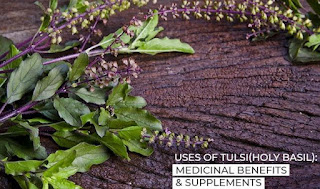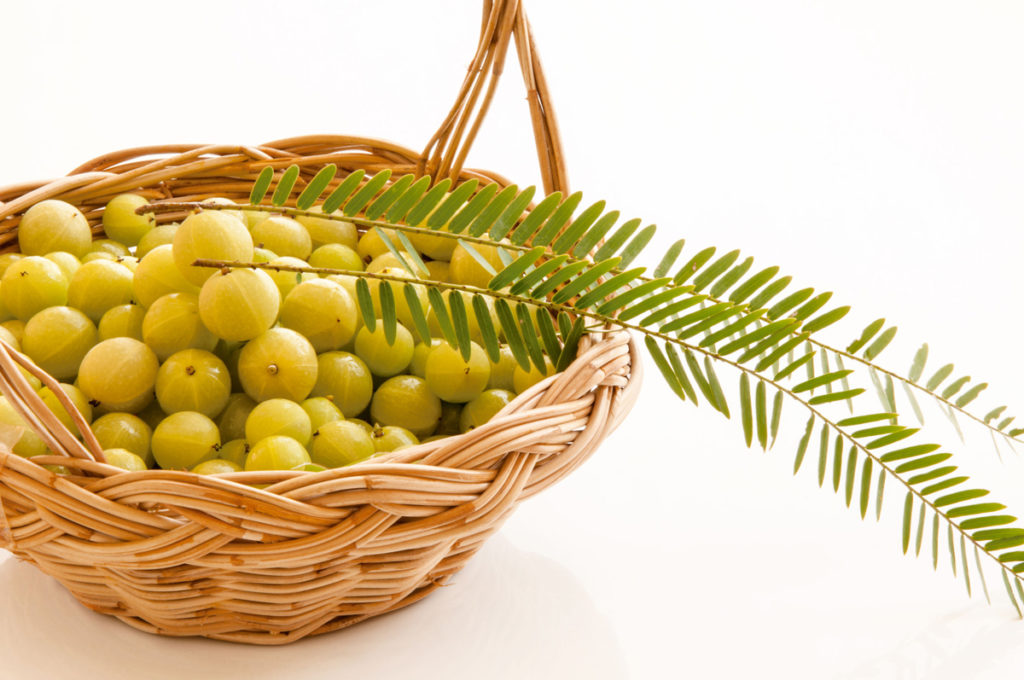Tulsi is called the queen of all herbs, it is used widely in Ayurvedic and naturopathic medicines which helps in the healing of the human body in a natural manner. Not only do Tulsi leaves benefit people, but its flowers too. Tulsi can help you get rid of many health problems ranging from fever to kidney stones. Ayurvedic texts have also categorised the wonder herb as a stimulant, antipyretic and aromatic in nature.
In Hindu religion, holy basil is both a religious symbol as well as a good medical remedy. Religiously speaking, holy basil is worshipped in the mornings and evenings by Hindus throughout India and medically speaking it is used to treat common ailments in the ancient Ayurvedic healthcare system.
What is Tulsi?
Tulsi also referred to as Ocimum sanctum or Holy Basil, is a medicinal herb that belongs to the mint family and is found in 150 different varieties worldwide. It emits a sort of spicy scent when applied to a wound and this is the reason as to why it is called the wonder herb. It usually has a bitter taste and its roots, leaves and seeds consist of several medicinal properties.
Did you ever know that tulsi tea aids in quick weight loss and reduces anxiety disorder? It is also used as a herb to treat thyroid and diabetes. Just as powerful as the tulsi flowers, its leaves are also equally powerful. Tulsi leaves can be added to hot water and it will help you when you are steaming to get rid of a bad cold or sinus.
Types of Tulsi:
There are three different types of tulsi or holy basil namely.
1. Rama Tulsi:
Rama Tulsi is also called as green leaf tulsi and this is a different type of tulsi breed that has light purple flowers and has a clove-like scent to it. It consists of eugenol which is usually found in cloves and has a mellow flavour.
2. Krishna Tulsi:
This type of Tulsi is also called as purple leaf tulsi and has a clove-like aroma. It tastes like pepper in your mouth. This type of tulsi helps cure infections such as throat infections, respiratory problems, earaches and skin diseases. The oil from Krishna Tulsi is used as ear drops. It is also used to cure malaria, indigestion, insomnia and cholera.
3. Vana Tulsi:
Vana Tulsi is a native to India, Sri Lanka, and Northeastern parts of Africa. This type of tulsi is usually grown for medicinal purposes and it is imbibed into Indian religious beliefs. This type must be protected freezing and will grow in conditions that have full sun and dry areas. It has light green leaves that are accompanied by a lemony aroma and flavour. Vana Tulsi leaves increases immunity and this is usually used for preparing tea. When consumed in the form of tea, it provides health benefits such as increased physical and mental endurance and adds more oxygen and nutrients in your bloodstream.
Benefits of Using Tulsi:
Western medicine gives you instant relief but comes with a lot of side-effects. Holy basil or Tulsi offers slow relief but you can be sure that there are no side effects and that is the reason as to why it is called the wonder herb. A single Tulsi plant can help you get rid of many health issues such as.
1. Tulsi for Skin:
Tulsi is proven to be the safest skin cream that can be used and the benefits are massive. Tulsi reflects on your skin when you consume it as well as applied. This wonder herb is used to treat acne, skin infections, lighten dark spots and improve skin texture. Here is a list of benefits that tulsi does to your skin.
Tulsi helps in skin brightening
Tulsi helps in curing acne face marks
Tulsi mixed with eggs and mixed can help in tightening skin pores
Tulsi helps in curing skin infections and any sort of skin allergies.
2. Tulsi for Hair:
Holy Basil can be applied to your hair for multiple reasons and all that it does is it makes your hair look better in all ways. Here are some of the ways in which tulsi can benefit your hair.
Tulsi can prevent hair fall
Tulsi can stop greying of hair and keep it thick and black
Tulsi can stop dandruff; and
Tulsi can prevent dry scalp
3. Tulsi for Weight Loss:
Tulsi is a natural ingredient that aids weight loss. If you’re wondering how to burn fat in a quick way without any side effects, then you need to opt for drinking tulsi tea. Two cups a day will make a difference. Also, you need to keep in mind that drinking tulsi tea will act more efficiently only if you workout. Of course without exercising tulsi tea can slim you down, but exercising will make the process faster. Here are some ways in which tulsi can help you lose weight.
Tulsi tea controls your metabolism and helps your body absorb essential nutrients.
Tulsi tea helps boost your digestive system which is important for losing weight quickly.
Tulsi tea has zero calories that boost your stamina.
4. Tulsi for Eyes:
Your eyes are prone to a lot of dust and pollution every day. Thus most people develop eye-related problems and Tulsi acts as an immediate cure for eye-related problems such as:
Tulsi soothes the eye
Tulsi leaves left in boiled water overnight can be used to wash your eyes.
Tulsi eyewash can also reduce strain on your eyes
Most importantly, it reduces the strain on your eyes and makes it feel relaxed. Tulsi eyewash can also help you prevent many other eye-related problems such as conjunctivitis and boils.
5. Tulsi Prevents Premature Ageing:
Vitamin C & A and phytonutrients are essential oils that are found in Tulsi, which are used as excellent antioxidants that protect the body from premature ageing. If herbal tea is said to make you feel and look young, imagine what Tulsi can do. Consuming 2 cups of Tulsi tea can help you look younger and prevent premature ageing.
6. Tulsi To Quit Smoking:
Tulsi leaves fight cancer prevent and prevents it from attacking you. The best aid to stop smoking is by munching tulsi leaves and this help get the nicotine content off your body. It helps in purification of blood. Here are some ways in which tulsi can help you stop smoking.
Every time you get the urge to smoke, chew Tulsi leaves
Make it a point to drink tulsi tea.
Tulsi can definitely help you stop smoking, provided you learn ways to deviate and curtail yourself from going against the urge. Its all in your mind and the power of becoming a deviant from the habit is the 1st step to change the habit.
Medical Use of Tulsi:
Tulsi is called the wonder herb or sometimes the holy herb because of its medicinal properties. There are many diseases that can affect people again after it has left the person. But with the consumption of Tulsi, you can be sure that these diseases cannot affect you. Here are some of the ways in which tulsi can sort out many medical problems.
Tulsi can cure fever
Tulsi leaves are used to treat skin problems like acne, blackheads and premature ageing.
Tulsi is used to treat insect bites
Tulsi is also used to treat heart disease and fever
Tulsi is also used to treat respiratory problems
Tulsi is used to cure fever, common cold and sore throat, headaches and kidney stones
Tulsi helps in treating Asthma
In simple terms, Tulsi is the best natural painkiller and solution to many of your health problems. It can be called the ancient healer of all diseases. It helps generate healthy mother milk during lactation.
Where to Get Tulsi Supplement?
Tulsi, the queen of herbs can be bought from an Amway distributor , and 100% organic.
Our air is filled with a lot of toxins and this can cause cold, cough and fever. The answer to this is Tulsi. We at Nutrilite have created a 100% herbal tulsi in the form of a tablet that can bid goodbye to your common cold, cough and fever.
Benefits of Tulsi Tablet:
Tulsi tablet consists of Tulsi extract taken from the Tulsi leaf that helps in treating the common cold, allergic rhinitis, cough and many other respiratory tract diseases. Tulsi also helps in treating cold-related problems such as sneezing and running nose.
Here are some benefits of Tulsi Tablet that be helpful for you.
Tulsi tablet can treat common cold
Tulsi tablet helps soothe your throat and cleans your respiratory tract
Protects you from respiratory tract infections
Helps in managing stress
How to Consume Tulsi Tablet?
Tulsi tablet can be taken two times a day, but it must be prescribed by a physician. Say no to side-effects by taking Tulsi tablet. Why worry when you can get a 100% organic herb in the form of a pill. This saves you the time of going to the market and buying the herb and boiling it in water and consuming it. All of this has been compressed in the form of a pill that can battle your cold, cough and other respiratory-related infections.
Well, if you are suffering from a bad cold or a cough, then Tulsi tablet can work well on you. You can confidently pop the pill as there are 0% side effects from it. Currently, most people all over the world are understanding the working ways of this wonder herb and its effects on people. This is challenging western medicine as it has zero side effects to its use. So, live healthily and bid goodbye to that horrible cold or a cough that you’re struggling with.











